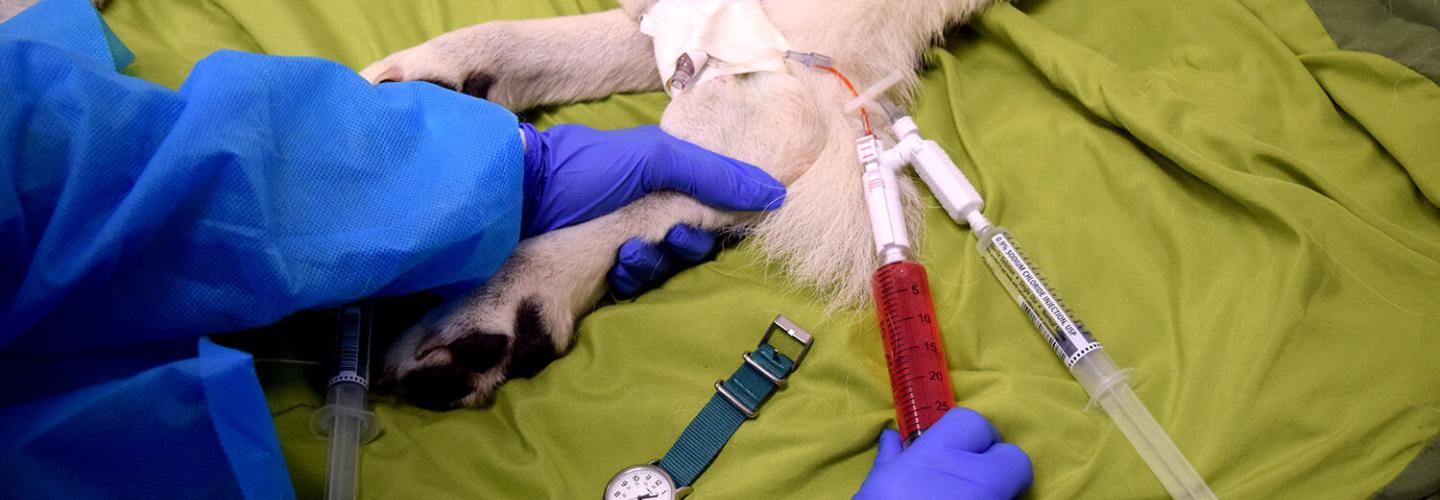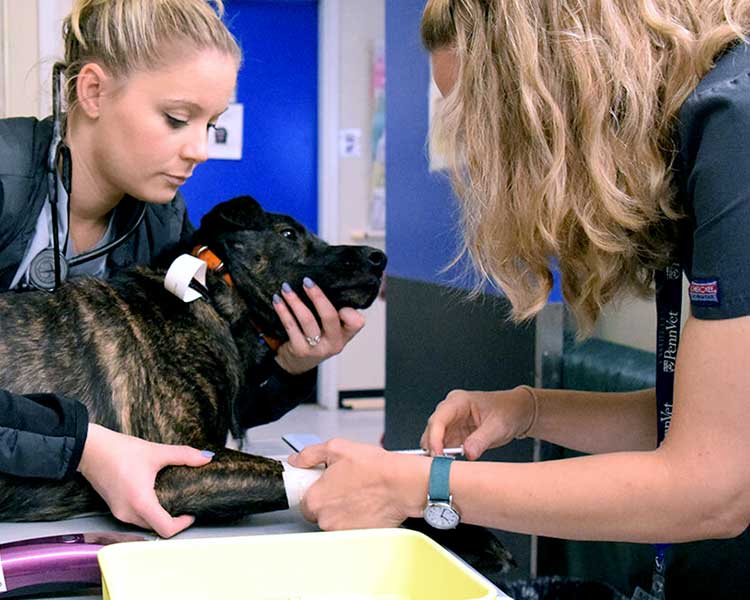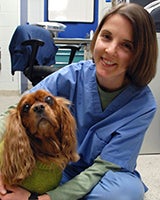
Clinical Trials | Veterinary Clinical Investigations Center (VCIC)
What we do
The Veterinary Clinical Investigations Center (VCIC) at the University of Pennsylvania’s School of Veterinary Medicine is an internationally recognized clinical research organization.

In collaboration with industry sponsors, Penn Vet clinicians, and partner academic centers, the Penn Vet VCIC team supports the design, coordination, and efficient implementation of veterinary clinical trials designed to identify novel approaches to disease diagnosis, management, and prevention.
The Center has long-established relationships with leaders in the veterinary pharmaceutical industry and maintains collaborative partnerships with other innovative academic centers. In addition to performing clinical trials, the VCIC offers an extensive range of clinical research operations services, including clinical trial project management, recruiting and marketing strategies, trial site selection and monitoring, record auditing, and data quality assurance and control.
Our Services
The VCIC works closely with corporate sponsors, individual clinicians, clients, and patients, offering services ranging from recruitment, study design, protocol compliance, quality assurance, data capture, and reporting, conducting clinical trials at both Penn Vet hospitals.
The VCIC has demonstrated an ability to recruit significant sample sizes in a wide array of disease models over more than 14 years of managing veterinary clinical trials. Ryan Hospital’s large case load combined with its extensive referral network of more than 3,000 veterinary practices make it uniquely suited for clinical trial recruitment and enrollment.
When a trial requires more animals with a specific condition than would normally be presented in the 34,000 pets that come to Ryan Hospital annually, the VCIC has a proven record for targeted recruitment of animals at over 400 percent above baseline presentation rate.
VCIC understands and employs recruitment modalities that are most effective for a given target population and can guide sponsors on the most efficient means to enroll the desired number of animals in a specified period of time for a given study, pain management, and disease specific recommendations.
Penn Vet has the expertise to implement and manage all aspects of veterinary clinical trials, from study set-up and recruitment to data collection and analysis, final study reporting and closeout. The center works closely with faculty members trained in epidemiology and trial design to ensure that projects are powered appropriately with a robust plan for statistical analysis in order to yield meaningful results.
The VCIC has the clinical research experience to identify and oversee clinical trial sites that are familiar with the international standards set forth in VICH GL-9 Good Clinical Practice as well as perform training for GCP.
Veterinary research nurses with extensive clinical and monitoring experience work on campus as well as with remote study sites to ensure protocol and regulatory compliance.
The implementation of a robust audit plan is vital to the success of any clinical trial. The VCIC at Penn Vet has developed business processes to optimize data capture rates and ensure protocol adherence so that a research question may be answered utilizing the most complete information set possible.
The center has extensive experience in the creation of data capture forms and competency using a number of commercial, governmental, and private electronic data capture modalities.
Final study reports are formatted according to FDA/CVM Guidance #85 Good Clinical Practices with technical recommendations provided in Guidance #104.
Frequently Asked Questions
Here are commonly asked questions and answers about clinical trials, which might help you better understand clinical investigations, their benefits, and what clinical trials entail.
Translational research bridges laboratory science and clinical medicine to develop new treatments. At Penn Vet’s Veterinary Clinical Investigations Center, we conduct clinical trials with client-owned pets and large animals, providing insights that closely resemble human conditions. This approach benefits both pets and humans by studying naturally occurring diseases in a real-world environment.
The Veterinary Clinical Investigations Center facilitates high-quality investigations in companion animals with diseases similar to human conditions. This intermediate step helps screen for efficacy and complications before human trials.
Advantages of Studying Human Diseases in Companion Animals:
- Similar biological and clinical conditions
- Complex tissue interactions
- Shared environment with humans
- Diverse pet population
- Comparable drug metabolism
- Ethical advantages over induced disease models
- Useful clinical and preclinical data
- Clinical trials investigate new methods of prevention, diagnosis, and/or treatment of various diseases and conditions.
- They also explore new avenues in surgical technique, nutrition, drug/medicinal therapies, and alternative medicine such as acupuncture.
- All of these approaches to prevent and treat disease are not only used in veterinary medicine but in human medicine as well and they all came out of successful clinical trials.
- Many of the naturally occurring diseases that affect our animal friends closely resemble those suffered by humans. As a result, animal clinical trials have a profound impact on not only our furry friends but ourselves as well.
- Although some consider the treatments/methods used in clinical trials to be “untested” they have actually been previously conducted using not only laboratory animals but also healthy volunteer animals before they are moved on to this stage.
- As part of a clinical trial, once owner’s permission is given, samples of blood, urine, or even tissue samples for biopsies may be taken from the pet depending on the trial protocol. This is done so the investigator can gain further information that may benefit present as well as future patients. In a nutshell clinical trials help us push the science of medicine into other realms and advance the way we care for our pets and our fellow humans.
- Everyone, both human and animal!
- Clinical trials offer hope and new solutions to human and animal patients. They can be very rewarding for the pet, their family, the veterinary investigator, and most importantly future patients.
- Many of the effective and commonly used treatments, surgical procedures, and medications are available today because of the participation of patients enrolled in clinical trials.
- Clinical Trial participants may also benefit from reduced cost or even free services, treatments, and medications depending on the particulars of the trial.
- But most importantly, all patients benefit from the compassionate and professional care provided by our veterinarians and veterinary nurses.
- One of the main benefits to enrolling your pet into a clinical trial is that the medicine, treatment, or surgical procedure being studied could help alleviate your pet’s pain and suffering.
- Also, since your pet would be enrolling in a clinical trial at Penn Vet you can have the peace of mind knowing that your special friend will be getting the best possible care from our licensed, professional and caring veterinarians and veterinary nurses.
- Some of our trials may offer free or discounted services, medicine, or treatments for your pet.
- The greatest benefit of all is the fact that through your pet’s participation they will help advance many facets of medicine and help countless other patients.
- You have many rights should you decide to volunteer your pet as a trial participant.
- First and foremost, you have the right to know and understand all of the risks and benefits associated with the study. These along with a thorough explanation of the trial’s goals and procedures will be discussed with you in detail by the veterinary investigator or the trial nurse before your consent is given.
- You have the option to withdraw from the trial at anytime. Once the trial or your participation is complete you have the right to be informed of the trial’s end results if available.
- Finally, your pet will not be enrolled in a trial unless all aspects have been completely explained and an “informed owners consent” document is signed stating that you have received all the information relevant to the trial. Then and only then will your pet be enrolled.
- Clinical trials are regulated at many levels. The Federal Government requires that all trials involving animals be approved by the Institutional Animal Care and Use Committee (IACUC). This committee includes physicians, researchers, veterinarians, and lay personnel who are not involved in the medical field.
- At the hospital level, the Clinical Sciences & Advanced Medicine Academic Department, which runs the Matthew J. Ryan Veterinary Hospital at Penn Vet, has an internal committee that reviews all clinical trials conducted at the hospital. The committee helps ensure that patients involved in clinical trials receive the same high level of quality care that all patients at the Ryan Veterinary Hospital are given.
- All staff involved in the various trials are required to participate in courses and pass examinations on safety, ethics, and animal care before they can work with a study patient.
The VCIC Team
The VCIC staff is comprised of clinical research operations professionals, veterinarians and clinical research nurses. The operations staff assists with contracts, proposals and business related matters. Veterinarians with advanced training in epidemiology, biostatistics and clinical trial design assist clinicians and principal investigators with protocol development and study design. The veterinary clinical research nurses in the center provide clinician support and project management while also providing high quality patient care.










